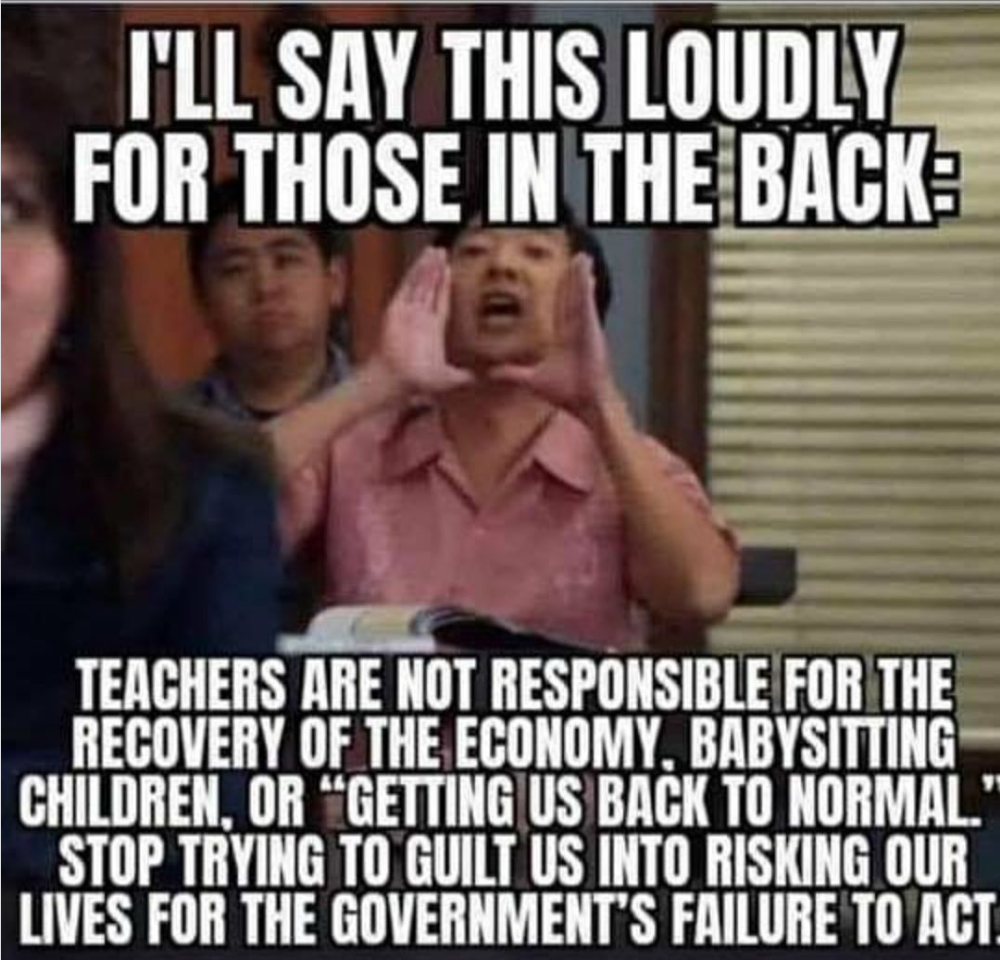By Jordan Berg Powers
There are only bad options for opening schools. A lot of times we say good/bad or better/worse, but in this case there are only BAD options. That is because once again our schools are being asked to fix our societal problems and lack of investment in people.

We should not play Russian Roulette with our children. If schools open, children will die because we opened schools. If schools open, teachers will die because we opened schools. How many kids should we sacrifice? What number of dead teachers and students is too many?
Covid-19 isn’t just the flu, often tragically, recovering is an ongoing and in some cases it appears life time process. Children and teachers face a lifetime of lungs hardening and damage; cardiovascular systems damaged and never recovered; and neurological damage that may not be reversible.
I understand the desire to open schools. If we are going to make people go back to work by blowing through phases of opening, schools have to be open. We can’t require people to work through this pandemic and not have a place watching and educating our kids. But we should be paying people to stay home. It’s not safe enough to be reopening the way we are. Not generally for sure, and even here in Massachusetts where cases are again starting to trend upward.
As Jennifer Serravallo said in a Facebook post: “With each day passing and every new convoluted hybrid plan floated (4 days on, 10 days home, 2 hours in, rest of the day home, in person once a week, the rest of the week at home, etc) school leaders are being forced to focus on reconfiguring classrooms, re-doing bus routes, planning for what to do when a teacher gets sick, keeping kids separated in hallways, and a zillion other details. We are wasting precious time. Instead, we can accept that remote instruction, while far from perfect, is safest and might even be the most pedagogically sound if it can be done well, and work to figure out how to make it better and more equitable.”
There is no doubt that our kids are falling behind from the lack of learning together in classrooms. We know this is especially critical in the first few years of kids’ educational lives; for 3-8 year olds socialization is as important as the substance of what they are learning. What would be equitable would be to ensure the kids who most benefit from in-person instruction get to meet in the schools. But that is unfair to those same kids, who by being in-person at schools are now more likely to get sick. There is a worry that online learning will exacerbate the already widening learning gap and thus the opportunity gap. But should we increase the likelihood of those kids dying, who won’t have what they need to successfully learn at home? That seems incredibly unfair, and my guess is that it would hit kids of color and poorer students harder than other students, the very families already with higher rates of Covid-19 cases.
If we don’t open schools families will struggle and kids who are behind are likely to fall farther behind. If we open, students and teachers will die. We are wasting time trying to figure out how to open schools, let’s keep people safe and instead invest in creating new ways to reach and educate kids. Let’s keep our children safe and not play Russian Roulette with their lives. Let’s demand we tax rich people and use the money to keep people home. Enough is enough. What Governor Baker is pushing, what Trump is pushing, what Betsy Devos is pushing is madness.
I expect that these children will absorb the shocks and surprises, and will probably have a very different outlook on the world than those who got their Bachelors in 2019. But I doubt they will be less educated. Most of what I learned was far from any school, and I was blessed with parents who taught me how to learn. I feel that is what parents and elders should be facilitating. When this pandemic passes, which it eventually will, educators will have to adapt their curriculum to their new independent learners. I think that is a good thing.
Nice blog here! Also your site loads up fast! What host are you using? Can I get your affiliate link to your host? I wish my website loaded up as quickly as yours lol